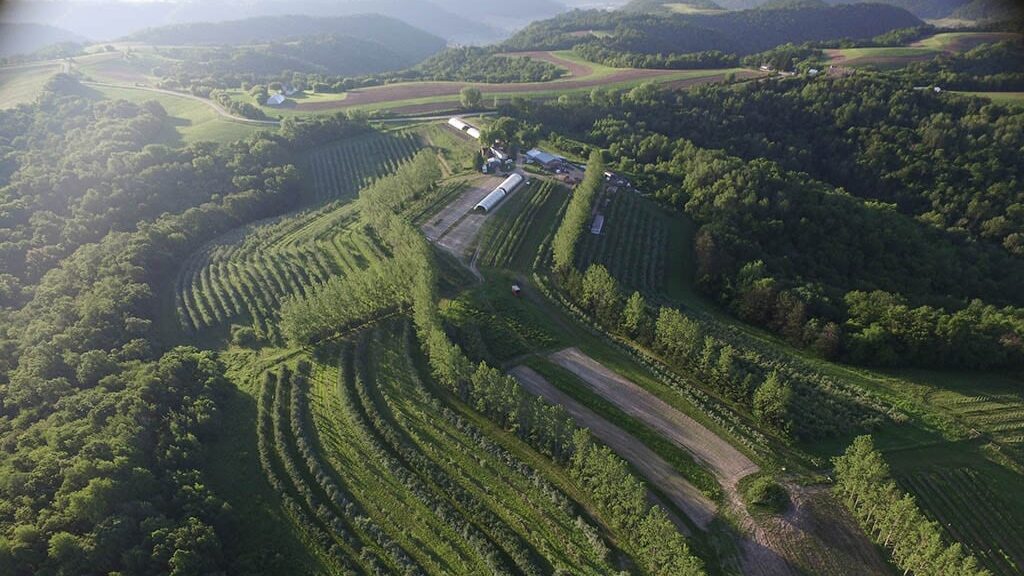$12.7 million in grants from Grantham Environmental Trust and the Matthew Zell Family Foundation will fund tree crop breeding to improve varieties for Midwestern farmers
Spring Green, WI — The Savanna Institute, the Grantham Environmental Trust, and the Matthew Zell Family Foundation announced today the launch of a Tree Crop Improvement Program to develop varieties of key nut, fruit, and timber crops for farmers and their markets. The $12.7 million in grant funding supports the first three years of an expansion in Savanna Institute’s efforts to equip farmers with the resilient, productive tree crops needed to increase the number of farms practicing agroforestry, which is the integration of trees, crops, and livestock in regenerative systems.
“We’re working to make tree crops more climate resilient and market viable for farmers who want to adopt agroforestry,” said Keefe Keeley, Executive Director of the Savanna Institute, a nonprofit based in Wisconsin and Illinois. “Our partnership with these visionary foundations begins to level the playing field for farmers who want to grow tree crops for the betterment of their farms, of our communities, and of the climate.”
The funding allows the Savanna Institute to establish one-of-a-kind breeding populations for key nut, fruit and timber crops, and apply cutting edge plant breeding techniques to develop improved varieties. Seven perennial crops were selected based on their ecological resilience, economic viability, and scalability for US markets: chestnuts, hazelnuts, elderberry, black currants, black locust, persimmon, and mulberry.
Chestnuts and hazelnuts are high-value nut crops with growing demand that outstrips current domestic supply. Elderberry and black currants are nutritious small fruit crops that mature relatively quickly compared to other perennial crops, allowing for faster returns on investment. Black locust, persimmon, and mulberry are all trees that grow calorie-dense livestock feed, making them ideal for silvopasture systems, which are pastures that incorporate trees.
Farmers use agroforestry to diversify their operations in multiple ways: planting trees and shrubs along field edges as windbreaks, integrating trees in managed pastures for shade, or planting trees in widely spaced rows between alleys of annual crops, which allows farms to benefit from both annual and perennial crop production. The Savanna Institute and its funders anticipate that improved tree crop genetics will increase adoption of these types of beneficial agroforestry practices, which scientists consistently rank among the most viable and efficient climate solutions available in the US.
“Agroforestry systems have major untapped potential to not only sequester significant amounts of carbon, but also provide numerous other climate, food security, and conservation benefits to our agricultural systems. We are excited to support Savanna Institute’s leadership in agroforestry as they boost the possibilities for tree crops,” said Maki Tazawa, Program Officer for the Grantham Foundation.
Previous Grantham funding built Savanna Institute’s research capacity, while the Matthew Zell Family Foundation has supported the organization’s efforts to bolster fruit and nut processing infrastructure. This new funding supports the next phase of Savanna Institute’s long-term work to develop improved tree crops for agroforestry systems. Learn more about Savanna Institute’s Tree Crop Improvement Program.
###
About the Savanna Institute
The Savanna Institute is a 501(c)(3) nonprofit organization that works with farmers and scientists to lay the groundwork for widespread agroforestry adoption. Since 2013, the Savanna Institute has conducted research, education, and outreach to support the growth of diverse, perennial agroecosystems in the Midwestern US.
About the Grantham Environmental Trust
The Jeremy and Hannelore Grantham Environmental Trust is a public charity with a mission of combating environmental degradation or preserving and protecting the natural environment. The Trust raises awareness of urgent environmental issues and supports organizations working to find solutions. Over the last few years, the Trust has funded an extensive portfolio of projects focused on reducing emissions and removing carbon directly from the atmosphere.
About the Matthew Zell Family Foundation
The Matthew Zell Family Foundation was established in 2018 and is currently focused on climate change and supporting local community organizations. Within the climate space, the Foundation is specifically focused on historically underfunded sectors like regenerative agriculture and water solutions.

